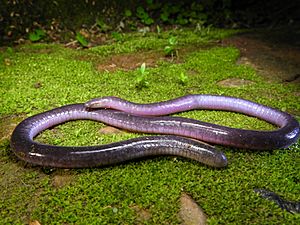Caecilia subnigricans facts for kids
Quick facts for kids Caecilia subnigricans |
|
|---|---|
 |
|
| Conservation status | |
| Scientific classification |
|
| Kingdom: | Animalia |
| Phylum: | Chordata |
| Class: | Amphibia |
| Order: | Gymnophiona |
| Clade: | Apoda |
| Family: | Caeciliidae |
| Genus: | Caecilia |
| Species: |
C. subnigricans
|
| Binomial name | |
| Caecilia subnigricans Dunn, 1942
|
|
| Script error: The function "autoWithCaption" does not exist. | |
Script error: No such module "Check for conflicting parameters".
The Caecilia subnigricans is a fascinating type of caecilian. Caecilians are a special group of amphibians that look a bit like large worms or small snakes. They don't have any legs! This particular species belongs to the family Caeciliidae. You can find Caecilia subnigricans living in the countries of Colombia and Venezuela.
Contents
What is a Caecilian?
Caecilians are amazing creatures that are part of the amphibian family, just like frogs and salamanders. But unlike frogs, they don't have legs. They usually have smooth, ringed bodies that help them burrow through soil. Most caecilians live underground, so they are not often seen. They are carnivores, meaning they eat other animals, often small invertebrates they find in the soil.
Where Does the Caecilia subnigricans Live?
This specific caecilian species, Caecilia subnigricans, makes its home in two South American countries: Colombia and Venezuela. These areas have warm climates, which are perfect for amphibians.
What is its Habitat Like?
The Caecilia subnigricans can live in several different kinds of places. It likes warm, wet areas. Its natural habitats include:
- Tropical Forests: Both dry and moist lowland forests are good homes for it. These are places with lots of trees and often a lot of rain.
- Plantations: These are large farms where crops like coffee or bananas are grown.
- Rural Gardens: Even in gardens in the countryside, you might find this caecilian.
- Degraded Forests: It can also live in areas where forests have been cut down or changed a lot by humans. This shows how adaptable it is!
Conservation Status
The Caecilia subnigricans is currently listed as "Least Concern" by the IUCN. This means that, for now, there are enough of these caecilians in the wild, and they are not considered to be in danger of disappearing.
See also
 In Spanish: Caecilia subnigricans para niños
In Spanish: Caecilia subnigricans para niños
 | Emma Amos |
 | Edward Mitchell Bannister |
 | Larry D. Alexander |
 | Ernie Barnes |


